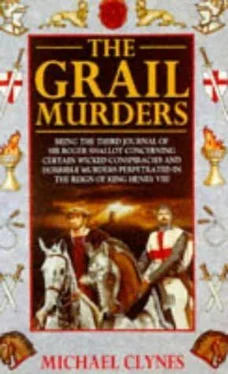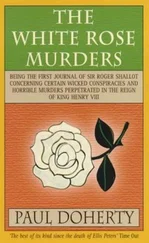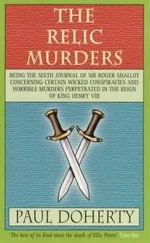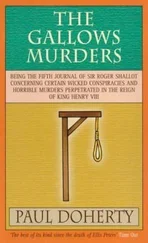Paul Doherty - The Grail Murders
Здесь есть возможность читать онлайн «Paul Doherty - The Grail Murders» весь текст электронной книги совершенно бесплатно (целиком полную версию без сокращений). В некоторых случаях можно слушать аудио, скачать через торрент в формате fb2 и присутствует краткое содержание. Жанр: Исторический детектив, на английском языке. Описание произведения, (предисловие) а так же отзывы посетителей доступны на портале библиотеки ЛибКат.
- Название:The Grail Murders
- Автор:
- Жанр:
- Год:неизвестен
- ISBN:нет данных
- Рейтинг книги:4 / 5. Голосов: 1
-
Избранное:Добавить в избранное
- Отзывы:
-
Ваша оценка:
- 80
- 1
- 2
- 3
- 4
- 5
The Grail Murders: краткое содержание, описание и аннотация
Предлагаем к чтению аннотацию, описание, краткое содержание или предисловие (зависит от того, что написал сам автор книги «The Grail Murders»). Если вы не нашли необходимую информацию о книге — напишите в комментариях, мы постараемся отыскать её.
The Grail Murders — читать онлайн бесплатно полную книгу (весь текст) целиком
Ниже представлен текст книги, разбитый по страницам. Система сохранения места последней прочитанной страницы, позволяет с удобством читать онлайн бесплатно книгу «The Grail Murders», без необходимости каждый раз заново искать на чём Вы остановились. Поставьте закладку, и сможете в любой момент перейти на страницу, на которой закончили чтение.
Интервал:
Закладка:
I was left to my own devices. I wandered back into the city and even thought of revisiting my old haunts but, near Whitefriars, a counterfeit man recognised me. Instead of the usual friendly salutations, he scuttled away down the alleyway to sell his information to men like Waller and others to whom I owed debts. A petite, pleasant-faced doxy, however, caught my eye and for a few hours I became old Shallot again, whiling away the time, telling the most outrageous stories and making her laugh both in the taproom and on her feather-filled mattress in the chamber above.
Lovely, lovely girl! She had eyes as bright as buttons, a sharp wit and the most beautiful pair of shoulders I have ever clapped eyes on. Ah, well, she's gone, for golden girls and golden boys must, in their turn, go to dust. A nice little phrase. I coined it but my good friend Will Shakespeare seized it for himself. That's the way with scribblers, they are for ever borrowing other people's quotations.
Refreshed and a little more composed after my love tryst, I went back to Richmond where Benjamin asked me to accompany Southgate to collect stores from the Tower. I reluctantly agreed and we went in silence down the mist-shrouded Thames to that narrow, evil fortress. We had to wait awhile; the troops there were drilling in preparation for being shipped to some Godforsaken town in the Low Countries to wage one of Fat Henry's futile, forgotten wars.
Now you will hear the old buggers tell you how their hearts are kindled and the blood bubbles in their veins at the prospect of war: banners snapping angrily in the breeze; war horses caparisoned for battle pawing the ground; brave young men in shining armour, their faces flushed with the prospect of war; swords sharpened, helmets plumed. It's a load of bollocks! That's how it begins but it ends in maimed bodies, chopped limbs, blood spurting like fountains. Green grass turning rusty brown, rivers choked with corpses.
Always remember old Shallot's military theories. First, where possible, run! Secondly, if that's not possible, surrender. Thirdly, volunteers never live till pay day. And I know! I have fought in too many battles and lost my boy in one, the only child of my third wife. I called him Benjamin because he wasn't like me, rotten and twisted, but tall and noble. A brave heart, oh sweet Jesus, he went to Ireland with Essex's armies and died in the bogs of Antrim. Oh, Lord, I miss him still! It's true what the Greeks say: 'Those whom the Gods love always die young'. In which case I'll live for bloody ever!
At the Tower, on that distant autumn day, the young men were preparing for war. The smithies were busy beating the rivets of armour into place, fashioning sallets, lances, swords and all the necessary equipment for killing. The young men practised in the dusty yards, swinging swords against each other or dodging the deadly quintain, the stuffed dummy with a club on either end so, if you didn't move quickly enough, you got a nasty bruise on your head. Old Shallot, as always, kept well away from this but Southgate seemed fascinated by it. After we had collected what we came for, he returned for one more look and broke his disdainful silence.
'I wish I was going to war.' His chilling blue eyes stared at me. 'Don't you, Shallot?' 'Oh, yes,' I lied. 'I dream of it every day.'
Southgate smirked. 'When we get to Templecombe, you'll wish you had.' He flicked a hand at the sweating soldiers. 'At least they'll know their enemy.'
We left Richmond two days later, early in the morning, just after first mass. Our small cortege milled about in the courtyard near the large double-barred gate of the palace.
Mandeville and Southgate slouched on their horses, both dressed in leather quilted jackets, their feet encased in long riding boots. They were armed with dirks, swords and daggers and wore large travelling cloaks. Behind them, as if carved in stone, were their two secretaries, Cosmas and Damien, who sat pulling their horses' reins, eyes fixed intently on Mandeville. A short distance away were the Santerres: Sir John shouting orders and beside him his wife, riding side-saddle, her desire to leave apparent in the agitated remarks she made to her husband. Rachel looked as pretty as a picture, her lovely body warmly covered by a grey riding cloak lined with miniver fur. The rest were servants and grooms with our baggage piled on a sturdy, four-wheeled cart.
'Mistress Santerre looks beautiful,' I whispered to Benjamin. 'She puts us all to shame. I tell you this, Master, if we met a pretty maid I suspect she'd fall in love with one of the horses before she took to any of us!'
Benjamin laughed. 'I just hope we will be safe, Roger,' he murmured.
'Oh, Lord save us, of course, Master! As bullocks on thin ice.'
(Looking back, I wish I hadn't said that. Words uttered in haste often have a prophetic ring to them; within a month Benjamin and I would be fighting for our lives on icy waters in Somerset.)
Soon we were ready. Mandeville, who saw himself as the King's own commissioner and therefore self-appointed leader, shouted orders; the great gates swung open, and he led us out. As we rode towards London, one of Mandeville's secretaries unfurled the pennant on a pole he carried bearing the royal arms of England, showing all and sundry that we carried the King's own warrant. As we passed people stood back on either side, loud-mouthed apprentices and washerwomen in leather clogs stopping their noisy clatter and waiting for us to pass. We reached the muddy cobbles of the city, going through Bowyers Row and up towards Cripplegate. On the corner of Carter Lane, with the mass of St Paul's cathedral towering above us, we had to pause whilst labourers using ward hooks pulled down the still smouldering, blackening timbers of a burnt-out tenement to ensure no spark ignited neighbouring houses.
At last a city official, wearing the blue and mustard livery of the Corporation, decided the burnt-out tenement had been sufficiently destroyed and we were allowed to pass on. Now, as I have said, Mandeville led us, the Santerres behind with their small retinue whilst we were at the back just before the cart. I looked hungrily around, drinking in the sights of London: the beaver hats, lined with green velvet, of the wealthy merchants, the shabby caps of the artisans and, above all, the ornate head-dresses covered in clouds of gauze of the court ladies stepping out for a morning's shopping. We reached St Paul's, the great copper eagle on its weather vane dazzling in the weak sunlight. (I remember it well for the sun shortly afterwards disappeared and we did not see it for weeks.) We had to halt as cartloads of bones dug up from the cemetery were taken down Paternoster Row to the enamel house.
As we did so, a ragged urchin slipped from the crowd and passed a piece of parchment to Sir John Santerre. I was about to tell my master when we heard the sounds of music coming from beyond the wall of St Paul's. Benjamin waved me over and we looked through the open gate. A group of musicians stood in the angle of one of the buttresses of the cathedral playing tambour and fife whilst the Dean and Chapter, garlands of roses on their heads, danced in solemn procession around the severed head of a buck which had been placed on a pole, its brown eyes staring glassily over those who now rejoiced at its death. At the foot of the pole the succulent body of the deer lay sprawled, blood still seeping from the severed arteries of its neck. I stared in astonishment at Benjamin.
'It's a custom,' my master muttered out of the corner of his mouth. 'Every month the city verderers have to deliver a fat buck for the Dean's kitchen; in thanksgiving the Dean and Chapter perform this dance.' He cleared his throat. 'God knows why, when they call themselves churchmen.'
I looked at the sleek, well-fed clerics performing their silly jigs.
Читать дальшеИнтервал:
Закладка:
Похожие книги на «The Grail Murders»
Представляем Вашему вниманию похожие книги на «The Grail Murders» списком для выбора. Мы отобрали схожую по названию и смыслу литературу в надежде предоставить читателям больше вариантов отыскать новые, интересные, ещё непрочитанные произведения.
Обсуждение, отзывы о книге «The Grail Murders» и просто собственные мнения читателей. Оставьте ваши комментарии, напишите, что Вы думаете о произведении, его смысле или главных героях. Укажите что конкретно понравилось, а что нет, и почему Вы так считаете.












